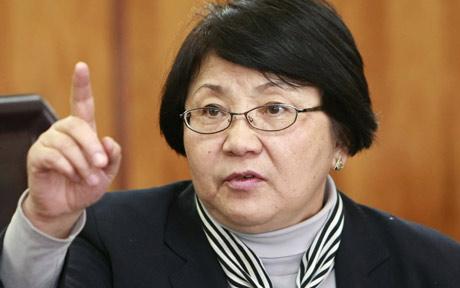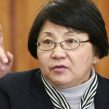
Kyrgyzstan Referendum: Questions Remain
Publication: Eurasia Daily Monitor Volume: 7 Issue: 128
By:

Kyrgyzstan’s June 27 referendum on the new constitution defied most skeptics’ expectations –it occurred amid relative calm across Kyrgyzstan and a large number of the ethnic Uzbek minority managed to cast their votes, despite the recent violence in southern parts of the country. Significantly, amongst approximately 70 percent of the people who voted last week, 90 percent supported the new constitution that establishes a parliamentary system (www.akipress.kg, June 28). The new constitution increases the number of seats in parliament from 75 to 120 and bans any party from gaining more than 60 percent of seats. This way the constitution’s architects in the interim government hope that no single political force or leader could usurp state power.
The referendum has received positive feedback from the Organization for Security and Cooperation in Europe (OSCE) and is perhaps the most transparent and orderly referendum that has taken place in Kyrgyzstan. Some Kyrgyz experts, however, claim that most people in Kyrgyzstan voted for stability and were familiar with only the basic elements in the new constitution.
The real challenge, according to the new constitution, still lies in the immediate future. The new constitution is supported by a combination of political forces guided by goodwill and those seeking to secure their own power (a parliamentary system is the only viable way to ensure their share in parliament). Because the results of the upcoming parliamentary elections on October 10 are uncertain, the electoral process might either prove to be the cleanest election to date in the region or descend into an ugly confrontation between the leaders of a few main political parties, among them the Social Democratic Party led by Almazbek Atambayev, Ata-Meken led by Omurbek Tekebayev, Ata-Shumkar led by Temir Sariyev, and Ar-Namys led by Felix Kulov. All these leaders, except Kulov, are members of the interim government. Reportedly, some leaders of these parties are closely connected to the criminal underworld and shadow economy.
In her address to the nation after the referendum, Kyrgyzstan’s interim president, Roza Otunabayeva, said: “people have put an end to the era of authoritarian family rule of the two previous regimes –Akayev and Bakiyev” (www.kyrgyz-el.kg, June 28). Addressing the frustrations of ethnic minorities in the country, she added: “the whole world is closely watching the referendum and convinced that we are a united country! Kyrgyzstan is indivisible!”
Russian President, Dmitry Medvedev, was amongst those who refused to share Otunbayeva’s optimism. According to Medvedev, Kyrgyzstan’s experiments with a new constitution are dangerous and might even lead to an “unpleasant collapse of the state” (www.interfax.ru, June 28). Medvedev’s views are widely supported by pro-Russian experts in Kyrgyzstan and reflect the external predicament that Kyrgyzstan faces today –none of its neighbors, including Russia, can boast about free and fair elections.
The referendum was held amid uncertainty over whether external forces provoked the violence in Osh and Jalalabad on June 11-14. Prior to the referendum, Otunbayeva was pressured, by her domestic opponents and international organizations, to postpone the referendum. Instead, she tried to reconnect with the Uzbek population –she travelled across Osh and Jalalabad oblasts speaking to local residents (www.24.kg, June 23). Her main goal was to reach out to the Uzbek population and convince them to vote. She argued that the violence was provoked by external forces, possibly by proxies of the former President, Kurmanbek Bakiyev (www.kyrgyz-el.kg, June 23).
However, Otunbayeva’s actions and statements did not correspond with the behavior of other government officials. Only hours before Otunbayeva visited some of the Uzbek-populated villages, the military was particularly ruthless in clearing out some areas of weapons and alleged provocateurs. Kyrgyz human rights activists reported Kyrgyz forces’ harsh treatment of men in Uzbek villages (www.akipress.kg, June 21).
Furthermore, Omurbek Suvanaliev, the former Interior Minister who took on the responsibility of quelling the violence in Osh, openly stated that the conflict was caused by inter-ethnic tension and not external provocation. He resigned from his post shortly after the situation stabilized in Osh.
Although a sense of normality is returning to Osh and Jalalabad, anger and frustration is still felt between Kyrgyz and Uzbeks. After the initial shock, both groups are trying to decide their future course of action. According to Alisher Khamidov, Osh Uzbeks are divided in their assessment of recent violence. Some argue that instead of accumulating capital they would have been better off paying bribes to the “lumpen proletariat,” including local government officials and religious leaders, while others wish they had spent more on weapons.
Otunbayeva has promised to bring stability to the region and rebuild destroyed Uzbek villages in the coming months. Her efforts are supported by the international community. Yet, her greatest challenge in reconstructing the country’s south, might come from members of the interim government, as well as from neighboring countries that shy away from supporting changes in Kyrgyzstan.




